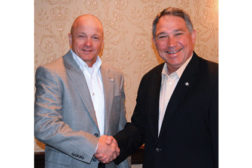Home » Geothermal Exchange Organization
Articles Tagged with ''Geothermal Exchange Organization''
Bill extends tax credits for energy-efficient residential and commercial property through 2021
Read More
GEO Comments on GHP-curbing Title 24
GEO Seeks Blanket Approval of GHPs in Current, Future Versions of the Code
May 11, 2015
GEO Pushes for State Actions
Organization Pushes for Recognition of GHPs as Renewable Energy Source
March 16, 2015
GEO Comments on EPA Rulemaking
Group asks EPA to Recognize Geothermal Heat Pumps in Proposed Rulemaking
December 15, 2014
USDA Funds Renewable Energy
Rural Energy for America Program Provides $68M for Projects
November 17, 2014
Oct. 20, 2014: GEO Working to Get Federal Incentives for Geothermal Heat Pumps Reinstated
Tax Benefits Are Extremely Significant for the Commercial Geothermal Heat Pump Market
October 20, 2014
Massachusetts Passes Thermal Energy Bill
Legislation will Promote the Use of Clean Renewable Fuels and Technologies
August 18, 2014
Geothermal Exchange Organization Elects Chairman
Blard Unanimously Elects Enertech Global's Steve Smith
June 23, 2014
GEO Attends Utility Meeting
GEO Urges Utilities to Adopt Geothermal to Meet Efficiency, Environmental Goals
February 10, 2014
Copyright ©2025. All Rights Reserved BNP Media.
Design, CMS, Hosting & Web Development :: ePublishing





